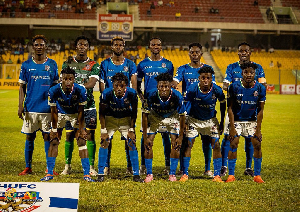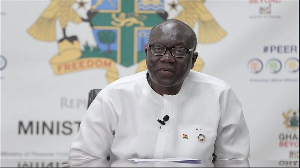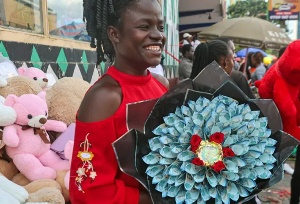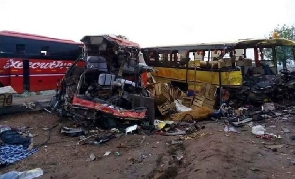Editorial News of Saturday, 3 April 2021
Source: GNA
The year of roads, myths or reality?
An expository tour of Accra brought to memory the old song literally translated “movement across has exposed me to things”.
Standing far at the end of the junction from the bus stop, there lies a stretch of road decorated with potholes and muddy water.
Drivers tumbled through the potholes and muddy waters reminiscent of football legendary Diago Maradona of Argentina on the football field or you risk breaking your car.
Now drivers on these decorated roads have to sharpen their skills in single movement or series of moves to avoid the potholes or run into it at a slow pace, you dare not speed.
Year of roads
The year of roads myths or reality? Hallucination or authentic? As I stood motionless at the junction totally lost in thought, I was rudely interrupted from the mental wonderland by shouts as a driver failed his driving manoeuvrings test and landed into a manhole in the middle of the road.
Sadly, I watched the passengers dropped from the bus slowly into the mud with calculated steps to avoid slipping or falling down, but the old adage which literally translated means “if you fear wearing muddy trouser, you will end up wearing its suit,” came to reality as a gentlemen missed a step and had a swim in the mud.
Others shouted ouch! Ouch! One wondered whether such roads still existed in the capital city of Ghana, Accra, considered as the haven for rural dwellers to seek greener pastures from.
Yes! Accra has all the good, the better, and the best of all things; it also has the bad things of life. Life in Accra is a mixture of the two-halves, sometimes it’s hard sometimes it’s good and romantic.
Accra has good infrastructure, which can compete well with other national capitals, but as a developing country, we are still far from the promised land.
Take a stroll to throw some communities right in the heart of the capital city, from Kwashiman to Santa Maria, to Sowutom, to Gbawe, to Mallam, to Ablekuma, to Awoshie to Darkuman and its environs and you will begin to have a totally different perception about road infrastructure.
The Ghana News Agency recounts that in January 2020, President Nana Addo Dankwa Akufo Addo declared the year 2020, as the “Year of Roads”. The President promised that the government would embark on an aggressive road development across Ghana.
Mr Ken Ofori Atta, Minister of Finance in his 2020 Mid-Year Review and Supplementary budget to Parliament re-echoed “The Year of Roads,” mantra stressing that despite the outbreak of the COVID-19 pandemic, substantial progress had been made in the road sector.
He listed major road infrastructure undertaken by government as the Tema Motorway Roundabout, a 3–tier interchange which was completed and commissioned, Pokuase Interchange under the Accra Urban Transport Project.
This involved the construction of a 4-tier interchange, progress currently stood at 74 percent, Obetsebi Lamptey Circle Interchange and ancillary works(Phase1), which was 45 percent completed, Tamale Interchange Project which was 40 percent completed, Kumasi-Lake Roads and Drainage Extension project at 55 percent completed as at June 2020.
He said residents of all urban areas, especially Accra, Ho, Kumasi, and Takoradi, were seeing improvements in inner-city roads in their metropolis.
In addition, the construction of critical inter-regional road projects and bridges, including; the Eastern Corridor Road Phase I, were all at various stages of completion.
However this could not be fully achieved due to the outbreak of the COVID-19 pandemic, and as such, President Akufo Addo in his inaugural speech declared 2021 as the “second year of roads”, saying he would focus and prioritize road projects to improve infrastructure this year.
“Our roads are being constructed at a faster pace than before, and yes, there are still many more kilometres to construct. We defined last year as the year of roads. This year will be the second year of roads as we continue with our focus on dealing with the deficits of our road infrastructure,” he said.
Case at hand
Sadly, however, improvements in inner-city roads cannot be said to be for the people living in the communities. Over the years road networks had grown from bad to worse and especially during the rainy seasons. They usually do not have proper drainage systems and as such houses along the stretch get flooded even with the slightest downpour. Commuters and residents at a point park their vehicles or risk visiting the mechanic shop every day.
Some residents wondered why city authorities over the years did not help to improve the situation. Others marvel how governments came and finished their terms with nothing substantial to show.
It is important to note that although the government has made all these efforts at improving the road networks in our inner cities, residents lament that a lot more still needed to be done. The roads lead to the markets, health facilities, offices, and educational institutions so the earlier something was done about them, the better.
Recommendations
The Department of Feeder Roads, the local authorities, and Department of Roads at the Metropolitan, Municipal, and District Assemblies (MMDAs), must ensure that such roads are considered, captured, and budgeted for immediate work to begin, in order to make them accessible to commuters.
It is also certain that roads are the veins through which a nation's economy throbs. By linking producers to markets, workers to jobs, students to school, and the sick to hospitals, roads are vital to any development agenda and bring economic and social benefits.
Roads make a crucial contribution to economic development and growth and bring important social benefits. They are of vital importance in order to make a nation grow and develop.
In addition, they help in fighting against poverty, by providing access to employment, social, health, and education services.
The issue currently is even worse in rural Ghana, which deprived them access to basic amenities and services. Quality roads ensure that the rural parts of the country have faster access to outside products, information, services, and social linkages.
To all those who have a stake in ensuring that the President achieves his “Second Year of Roads” agenda, the time is obviously now. They need to take a second look at how best to tackle this situation holistically, with all stakeholders.
Roads would always be an integral part of the development of every country, however as we build or construct roads, the culture of maintenance which least exists in the Ghanaian dictionary must be looked at.
We need to consider the cost involved in constructing and try as much as possible to maintain them in order to extend the life of the pavement, enhance the performance, and reduce user delays on the roads.












